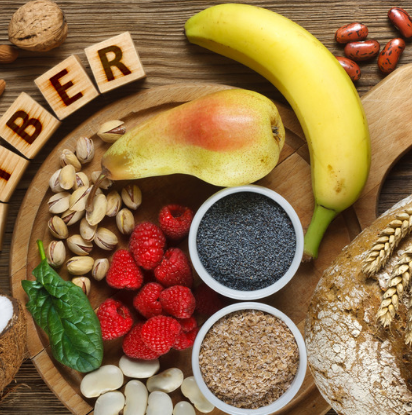

Maintaining a healthy diet is the cornerstone for managing diabetes. The goal is to eat nutrient-dense foods in balanced portions to maintain stable blood glucose levels.
Diabetes is a complex metabolic disorder that demands careful attention to diet, as well as regular monitoring of blood sugar levels.
The strategy of eating regular meals, as advocated by sources like the Mayo Clinic, plays a key role in optimizing insulin function, whether it’s naturally produced by the body or administered through medication. This approach helps to prevent blood glucose fluctuations and ensures more predictable metabolic responses.

As we observe National Diabetes Awareness Month, Our Today has put together some nutritious foods for persons with diabetes.
Foods such as healthy carbohydrates, fibre-rich foods, heart-healthy fish, and healthy fats are indeed foundational to a well-balanced diet for people living with diabetes.
Healthy Carbohydrates
Carbohydrates are one of the key nutrients that directly impact blood sugar levels. However, not all carbohydrates are created equal. Foods rich in complex carbohydrates and fibre are ideal for managing diabetes.

- Fruits: While fruits contain natural sugars, they are also rich in fibre, vitamins, and antioxidants. Whole fruits, particularly those with a low glycemic index (such as berries, apples, and pears), have less of an impact on blood sugar than fruit juices, which lack fibre and can cause rapid spikes in glucose levels. It’s advisable to consume whole fruits with their skins when possible to maximize fibre intake.
- Vegetables: Non-starchy vegetables (such as leafy greens, broccoli, cauliflower, and bell peppers) are excellent choices for diabetics, as they are low in carbohydrates, high in fibre, and rich in micronutrients. Starchy vegetables, like potatoes and corn, can still be part of the diet but should be consumed in moderation and paired with protein and healthy fats to mitigate their impact on blood sugar.
- Whole Grains: Whole grains like quinoa, brown rice, barley, and oats provide fibre, which slows the digestion of carbohydrates, helping to regulate blood sugar levels. They also contain essential micronutrients, including magnesium and B vitamins, which support overall metabolic function.
- Legumes: Beans, lentils, and peas are rich in both fibre and protein, making them an excellent choice for stabilizing blood sugar. They have a low glycemic index, meaning they cause a slower, more controlled rise in blood glucose.
- Low-Fat Dairy: Dairy products like milk, yoghurt, and cheese can be part of a diabetes-friendly diet, but it’s important to choose low-fat options to avoid excess saturated fats, which can exacerbate insulin resistance over time. Dairy also provides calcium and vitamin D, which support bone health.
Foods Rich in Fibre
Fiber plays a central role in diabetes management, as it not only slows the absorption of sugar but also helps maintain satiety, reducing the risk of overeating and weight gain. There are two types of fibre to consider:

- Soluble Fiber: Found in foods like oats, apples, and beans, soluble fibre helps to lower cholesterol and regulate blood sugar levels. It binds to water and forms a gel-like substance in the intestines, slowing the absorption of glucose into the bloodstream.
- Insoluble Fiber: Found in whole grains, nuts, and non-starchy vegetables, insoluble fibre helps promote healthy digestion and prevent constipation, which is an added benefit for people managing diabetes.
Heart-Healthy Fish

Individuals with diabetes are at a higher risk for cardiovascular diseases, making the inclusion of heart-healthy fish essential. Omega-3 fatty acids found in fatty fish like salmon, mackerel, sardines, and tuna offer significant benefits. These essential fats have been shown to reduce inflammation, lower triglyceride levels, and support overall heart health. Omega-3s are particularly beneficial for reducing the risk of atherosclerosis (plaque buildup in the arteries) and improving the function of endothelial cells that line the blood vessels.
Healthy fats
Healthy fats are crucial for overall health, but they are especially important for people managing diabetes due to their role in improving insulin sensitivity and controlling blood glucose levels. The fats found in avocados, nuts, and plant oils are particularly beneficial.

- Avocados: These fruits are rich in monounsaturated fats, particularly oleic acid, which has been shown to improve insulin sensitivity. They are also packed with fibre and important micronutrients like potassium, which support blood pressure regulation.
- Nuts: Nuts such as almonds, walnuts, and pistachios provide a combination of healthy fats, fibre, and protein, which help to stabilize blood sugar levels and improve satiety.
- Oils: Oils such as olive, canola, and peanut oil are rich in monounsaturated and polyunsaturated fats, which support healthy lipid profiles and help to improve insulin sensitivity.
- In contrast to unhealthy fats like trans fats or excess saturated fats, these healthy oils can help maintain proper metabolic function and reduce the risk of heart disease, which is a common comorbidity of diabetes.
READ: Wellness Watch| Understanding diabetes







Comments